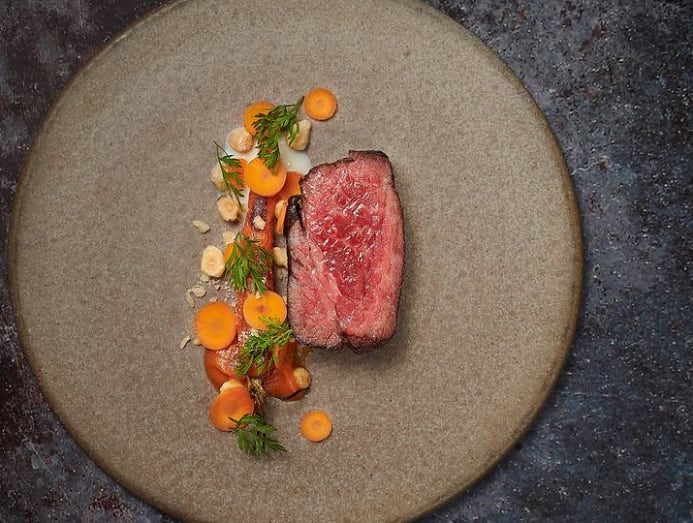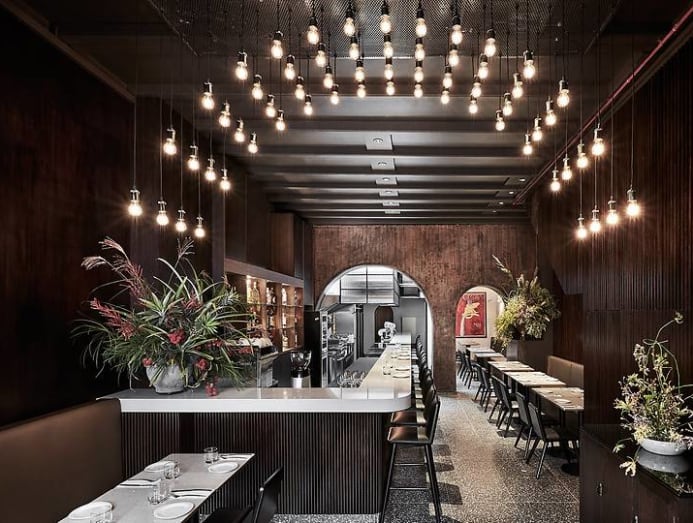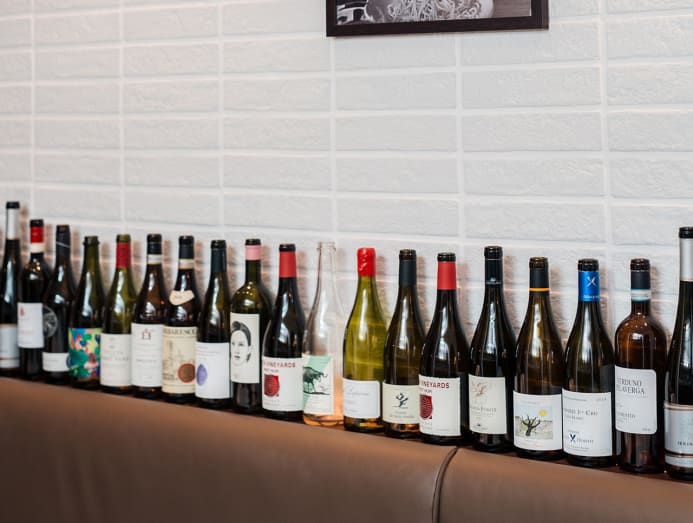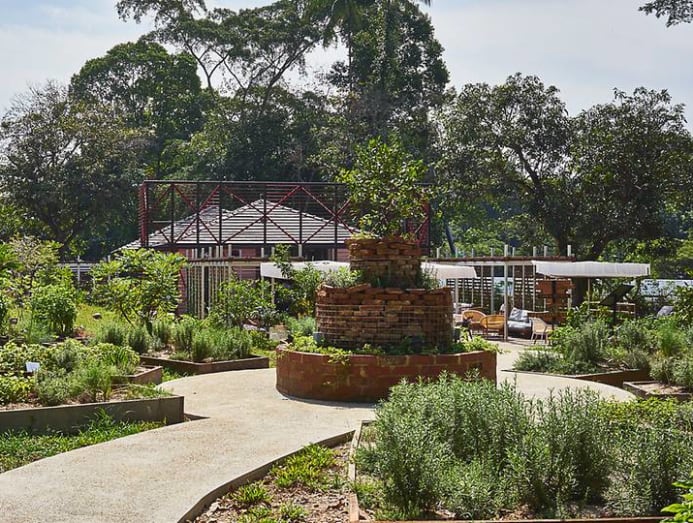How Singapore’s restaurateurs are rising to the challenges of sustainability
Rising nutrient costs, climbing rents and bereft manpower are famously constant challenges in Singapore'southward eating house industry. Now add to that sustainability. As environmental consciousness and social responsibility go among the about talked-almost topics in the world, restaurants have become the nigh attainable venues for customers to demand transparency and ethical practices.
Call back about it: As a land whose national pastime is dining out, who amidst us doesn't want our meals to come from a identify that is kind and nurturing to the environment, supports sustainable practices and creates little or nada waste?
READ> The chef who puts everything from fish bones to used coffee beans to delicious utilize
Today, there are numerous nuances to sustainability that a eating place must consider, the biggest of which is waste material. "The reality is that our overall industry in Singapore runs at 1.6 per cent profitability, which means something is incorrect. How much are we wasting every solar day?" asked Chris Millar, Culinary Managing director of the one-Grouping, which is behind restaurants like Summerhouse, one-Altitude and Botanico.
"Sometimes, the higher the turnover, the higher the wastage, which can outcome in higher losses. So, sustainability must go deeper and across simply saying we buy fish from a local fish farm," Millar added.
Good restaurants take long made it a signal to use all parts of the produce it buys. Parlaying lobster shells into bisque and vegetable trimmings into broths have always been par for the course; it just wasn't something the industry crowed about.
Simply with the public eye on sustainability comes the demand for visibility of this commitment to waste reduction. To that end, restaurants like Salted & Hung have introduced menus that revolve around the creative use of even the scrappiest ingredients. Fish bones, for instance, are infused with soy to yield an aromatic sauce, and then dehydrated and turned into crispy crumbs which are used as garnish.

Information technology'Southward NOT EASY Existence Dark-green
The reduce, reuse and recycle mantra applies across food likewise. In the last twelvemonth, companies like Cicheti Ventures, The Lo & Behold Group and Spa Esprit Group have eliminated the apply of single-use plastic straws, replacing them with reusable metal ones or straws made from biodegradable materials like tapioca.
Similarly, at the likes of Tiong Bahru Bakery, plastic numberless are eschewed for reinforced paper bags, while plans are underway to replace plastic juice bottles with drinking glass ones, said parent company Spa Camaraderie Group'south founder Cynthia Chua.

Ironically, sustainability is expensive and requires a substantial fiscal commitment. Because of factors like smaller economies of scale and higher compliance costs, eco-friendly options such as biodegradable packaging can cost up to three times the price of its eco-hazardous plastic counterparts.
Norwegian fast-casual concept Pinkish Fish, which recently opened his commencement international outpost at Jewel Changi Airport, knows this well. It uses but biodegradable and compostable materials for its packaging, cutlery and crockery. "It costs iii times more (than plastic), merely if nosotros want to be the change," said CEO Ronny Gjose, "we must evangelize."
Convincing diners to pay a premium for these practices requires some creativity. But information technology helps that today'due south diners take a genuine interest in the provenance of their food and drinks, how the produce is grown and the methods in which they are cooked.
All that makes for skillful stories – which are the lynchpin of good marketing – be they about dearest from urban rooftop hives tended to by a former-banker-turned-beekeeper, or small-batch cheeses made by a lone fromager in a far-flung village in French republic. In sustainability terms, the route to a good story near produce leads back to traceability, an chemical element that restaurants have likewise begun to focus on.
"For us, information technology's about reaching an audience who are concerned about sustainability, traceability and farm-to-table concepts," said Loh Lik Peng, founder and director of Unlisted Collection, whose stable of restaurants include Nouri, Pollen and MeatSmith.
"We work closely with farms so that nosotros take much more integrity and options in terms of organic produce. This is of import even in our meat-centric restaurants considering people desire to know where the meat is from, how the animals were treated and how they are smoked in the kitchens."
READ> Unique Food Trails: Loh Lik Peng recommends rustic adventures in Italy
NATURALLY RESPONSIBLE
The button towards supporting sustainability has afflicted wine lists too. Increasingly, restaurants are spotlighting natural wines, which are farmed organically or bio-dynamically and made without any additives or processing aids. "Minimal man intervention yields the nigh interesting outcomes and showcases the grape varietal in their truest forms," explained Ong Liling, managing director of Cicheti Ventures, whose establishments include Bar Cicheti and Fynn's.
"Non just that, by showcasing the winemakers, nosotros are supporting a new style of farming that eradicates the use of pesticide and chemicals in the soil and sulphites that are usually added during the fermentation process. Again, the theme of bringing people back to nature is integral to the principle of sustainability."

No doubt, sustainability is a tricky subject area – every endeavor to do good seems to come with a contradiction. "You tin can buy all the organic produce in the globe, for example, but if it comes wrapped in a lot of plastic, and then what'southward the signal?" said Chef Julien Royer, who's restaurant Odette recently won the drape of Asia's Best at the Earth'south 50 Best Restaurants Awards.
"It's hard to talk about sustainability in restaurants considering it's complicated. So I think for me, the most important thing is to ensure that nosotros don't waste anything."

Ultimately, bearing responsibleness for the planet's wellbeing lies at the core of sustainability, and it is a journey that does non and should not take an endpoint. Like any not bad movement of modify, sustainability involves immense time, endeavour, financial commitment and a shift in mind sets that must permeate an unabridged organisation.
And every bit with all dandy things, the beginnings prevarication in the small steps. Equally Ong said, "[Adopting sustainability] is a process that must be consistently nurtured and I truly believe that every bit long equally a restaurant does its best to minimise wastage – in food, water and electricity – and then that in itself is already a huge footstep."
READ> A guide to sustainable eating – for you, the planet and generations to come up
Source: https://cnalifestyle.channelnewsasia.com/experiences/how-singapore-restauranteurs-are-practising-sustainability-2019-239626
Post a Comment for "How Singapore’s restaurateurs are rising to the challenges of sustainability"